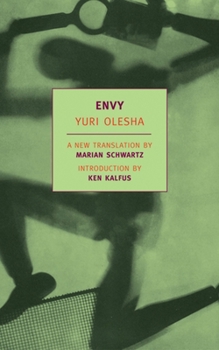Envy
Select Format
Select Condition 
Book Overview
YUriya Karlovicha Oleshu (1899-1960) v krugu pisatelej-sovremennikov nazyvali "korolyom metafor." Olesha ne umel pisat "temno i vyalo," dlinno i skuchno, ego proza iskritsya blestyaschimi obrazami i... This description may be from another edition of this product.
Format:Paperback
Language:English
ISBN:1590170865
ISBN13:9781590170861
Release Date:May 2004
Publisher:New York Review of Books
Length:152 Pages
Weight:0.40 lbs.
Dimensions:0.4" x 5.0" x 8.0"
Customer Reviews
5 ratings
A quick and fantastic snapshot of Soviet history
Published by Thriftbooks.com User , 15 years ago
I thoroughly enjoyed this book, which I spotted on a table in an Oakland bookstore. The prose is spare and short and the imagery is excellent. The division between real life and dreams is blurred, time does not always march forward. The portrayal of insatiable envy is tragic and believable. The theme of the revolution of the technology man captures a snapshot of history, and even reading the biography of the author in the front is time engagingly spent.
A small gem from a Russian writer, Envy was published when literary expression earned the writer gov
Published by Thriftbooks.com User , 17 years ago
I had difficulty reading the first few pages simply because I didn't catch on that the first person narrator--who is derisively observing his roommate's bathroom routine--is to some degree emotionally destabilized by his own hard life as well as misplaced perceptions. I usually prefer lyrically-written work with sentences that flow beautifully, however, while reading Olesha's Envy, I realize just how much the novels I prefer are the way they are because the writer lives in an environment that enables some hope. As harsh as the environment is, Olesha's novel is peppered throughout with charming phrases which disarm the critical reader: Valya was "lighter than a shadow. The lightest of shadows--the shadow of falling snow--might have envied her" (54). The novel's Introduction, by Ken Kalfus, is informative. Envy was published in 1927 when some form of satirical protest against the Soviet government was still possible; Lenin had died in 1925 and Stalin had ousted Trotsky, and it wasn't much longer--in about 1934--that it was no longer possible for a writer or journalist to speak and write freely. Olesha's work was suppressed and not re-printed until after Stalin's death in 1956. At only 152 pages, this novel is ideal for high school students wanting something more than routine American literature; honors students can definitely handle comparing the fictional treatment of social conditions. Also college freshman in Comparative Literature or fiction writing can study how a writer's environment conditions the craft of fiction. To go into more detail, if the world of Envy feels claustrophobic, there are good reasons: Yuri Olesha's narrator, or main character, is responding to a society in which the rich and poor are increasingly polarized. People in control seem to dominate the powerless, and those in control are absolutely stupid and boring people. The conditions Olesha wrote about also indicate that most people have diminishing expectations for the future, and to want change seems futile because change is impossible. (Sorry if this situation sounds familiar in 2006.) To create a novel out of this sort of human dilemma, conditions which were escalating in 1920's Russia, the author had to position himself somewhere between the two poles of rich and poor, of government official and social outcast. To do so, Olesha created the character Nikolai Kavalerov, a sort of slacker or lay-about whose vague or shapeless revolt against his conditions engages the reader's attention. The novelist's craft must give the characters energy so that the plot moves forward to some resolution; to do that, Olesha gives Kavalerov a kind of offensive honesty, a raw self-expression. One-third of the way through the novel, Kavalerov writes a cathartic letter to Comrade Babichev declaring, "Actually, I have just one feeling: hatred. . . . And like all officials, you're a petty tyrant." To understand this eruption as refreshing or humorous, one must read carefully
Olesha's Envy
Published by Thriftbooks.com User , 22 years ago
I love this book. Olesha is a masterful artist and his descriptions of the world are strange and wonderful. He is my favorite Russian author save Gogol.
As Wild and Doped Up As Hamlet's Ophelia
Published by Thriftbooks.com User , 22 years ago
This book is magical! (Wink, Wink) You start off reading from the first person perspective; but before you realize it, you are reading from a third person point of view. From first to third, you will be stratching your head and asking yourself, "The main character, what's up with him? Is he on [drugs]? Is Ophelia really alive?" And the comments you make to yourself. "I didn't know they had minage a tois back then" or "Wow...people can people really get excited about sausages." Of course, if you are reading this book for a class, you might want to ask yourself: "Am I reading an anti-socialist criticism of the Bolsheviks or the proproganda of poletariats? Is this an examination of values between two different generations?"But for what ever reason you pick up this book to read, it is going to be like Dostoevsky's "The Double" or Mandelstam's "The Eyptian Stamp" all over again, but only this time you feel as if you are high [or something].
Unknown piece of genius writing
Published by Thriftbooks.com User , 24 years ago
If you can scare up a copy, do it. This book has a dreamy, insane, "Russian" quality I haven't come across in anything else except Gogol and Dostoyevsky. The book was written shortly after the Bolshevik Revolution, during a brief period when artists still had a fair amount of freedom in Russia. It's a haunting book about dehumanization and insanity.





